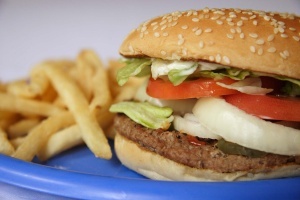 A new study is showing that immigrants are choosing American foods and American portion sizes, part of something they call “fatting in,” where immigrant groups eat high-calorie American meals to fit in with American culture.
A new study is showing that immigrants are choosing American foods and American portion sizes, part of something they call “fatting in,” where immigrant groups eat high-calorie American meals to fit in with American culture.
From the press release:
Immigrants to the United States and their U.S.-born children gain more than a new life and new citizenship. They gain weight. The wide availability of cheap, convenient, fatty American foods and large meal portions have been blamed for immigrants packing on pounds, approaching U.S. levels of obesity within 15 years of their move.
Psychologists show that it’s not simply the abundance of high-calorie American junk food that causes weight gain. Instead, members of U.S. immigrant groups choose typical American dishes as a way to show that they belong and to prove their American-ness.
More after the jump…
The results of this study are published in the June issue of Psychological Science. Studies like this one have shown that diets of immigrants, including those from Asia, Africa and Central and South America, worsen the longer they stay in the United States. This study was rather interesting as it focused on Asian Americans, and tested their reaction to hearing things like “You have to be an American to participate in this study” before being asked to select a food choice from an Asian or American restaurant. The belief that they wouldn’t be “American” enough led many in the study to choose fattier American diet based foods compared with those who weren’t given the same message before being asked to choose.
The researchers surveyed Asian-American and white college students to learn about embarrassing childhood food memories. Sixty-eight percent of the Asian-American respondents recalled food-related insecurities around white peers while growing up, like awkwardness about using chopsticks and the custom of eating all parts of the animal – chicken feet, fish eyes and pork head. Only 27 percent of white respondents remembered embarrassing food practices from childhood.
As an immigrant child myself, I can easily relate having grown up in an all white New York suburb. Because my family didn’t have much money, my mom made her own rou-song from fish we caught ourselves. The other kids at school teased my sisters and myself, because we brought sandwiches made from peanut butter and rou-song, and the kids said we were eating ants, since rou-song from fish was dark and did have the appearance of small bugs. I remember wishing I could have brought anything normal to school for lunch. When I reflect on my childhood today, it’s funny because our lunch room never actually served normal “American” food. Instead it was just as likely the cafeteria served peanut butter and jelly on matzah bread, as they were to serve spaghetti and meatballs.
As my parents inched slowly towards the middle class, we no longer depended as often on bringing our own lunch to school, so that by the time I was in high school, I had the chance to go out with classmates during lunch period, to where else, but the iconic American institution of McDonald’s. We hung out there almost every day during our lunch period, eating lunches of burgers and fries, definitely enjoying the American diet. But lucky for me I had a high metabolism in high school and the effects of fast food didn’t show. If anything I was under weight.
Now that I’m well past 40, the effects of the American diet are very obvious; with high salt and cholesterol, I find myself with high-blood pressure and high cholesterol. My blood sugar is also beginning to inch its way up there, but not yet high enough to be of concern. My doctor has me on medication for the blood pressure and the cholesterol, and I’ve been trying to modify my diet to be less “American,” which is not an easy task when you have a five year old who will only eat hot dogs, pizza, and mac and cheese.
The good thing is my daughter has no qualms about eating mooncakes, rou-song, rice crackers, sesame balls, and other Chinese delights. But I fear as she gets older, peer pressure may make her shun some of her favorite Chinese foods. One of the benefits of living in the Bay Area, is that hopefully for her, some of these same foods will be considered normal by her peers.







